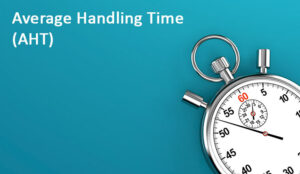The target for many contact centre managers is to get as many calls answered and dealt with as quickly as possible. So the faster the call, the better things are.
But Martin Jukes argues that reducing call duration could be counter-productive, and could drive a higher level of repeats calls.
The most common key performance indicators (KPIs) are still those based around the number of calls answered and the speed with which they are answered.
Others with a financial hat on will measure performance by the cost per call. So for many organisations the answer is simple: deal with a call as quickly as possible to be able to move on to the next one!
The faster the call, the lower the cost per call!
In many cases an improvement in process, technology or training will achieve this reduction, but for organisations that are not introducing these changes, the main method of reducing call duration is to apply pressure to front-line staff to work faster and deal with enquiries quicker.
So why is that not always the best way?
Firstly, developing a relationship with a customer will almost certainly make them feel more comfortable and open to ideas, suggestions and possible up-selling.
When I was a manager responsible for voice systems I was introduced to a new account manager from one of our suppliers. This person worked diligently for two years without any sign of new business, which stood out when compared to other suppliers who only came to life when there was a possible sale!
When the time came to purchase a new system (and it was very urgent, as usual) I went straight to this account manager. He had worked hard to build a relationship with me, his customer, without the motivation of a sale.
He realised the benefit of building that relationship and invested in it sufficiently so that when we had an urgent requirement, I called him straight away. I had developed trust in him and his company and, of course, he delivered accordingly.
‘Processing’ telephone calls will lead customers to feel that they are simply a number or even, in some cases, an inconvenience. There is a desire from customers to be recognised as individuals and treated accordingly.
CRM systems don’t seem to have built personalised service
Personalising service is very difficult without building and developing relationships. The investment in CRM systems has been significant over many years, yet these systems need to be used to develop and build relationships in order to be able to deliver personalised service.
The customer experience should be based around that individual customer and their individual circumstances at that time. The need for empathy during customer contact has never been greater and it is this that will deliver long-term benefits in managing the customer relationship!
The term ‘customer experience’ is relatively new but the use of customer journey mapping, touchpoint analysis and moments of truth has been around for years. Being able to measure the customer experience is more difficult and should use a proven methodology.
Secondly, for every call there is always a natural flow, as shown here with an assumed duration for each stage, producing a total of 3 minutes 30 seconds.

If we have two calls, the total handling time will be 7 minutes.

But if two enquiries were dealt with in one call then the total call duration would be 5 minutes 30 seconds, a saving of 90 seconds or 21%.

For three enquiries, the saving would be even more – 7.5 minutes instead of 10.5 minutes (28% saving).
In addition, the total time spent by the customer will also have reduced and the overall customer experience is improved. So improving the quality of the interaction will have a real benefit in terms of reducing the total handling time.
To demonstrate this approach we can look at some benchmarking data that we have from a couple of years ago.
In 2010, our client took 12 calls from each of their customers and had an average handling time for each call of 257 seconds. We asked them to focus on improving the quality of those calls and in 2011 we saw an amazing change. The AHT had increased to 270 seconds, but the average calls per customer had reduced to 11.
The impact of this was as follows:
|
No of calls per customer |
Average Handling Time |
Total Handling Time |
|
|
2010 |
12 |
257 seconds |
12,047 hours |
|
2011 |
11 |
270 seconds |
11,888 hours |
We can see that there was a direct correlation between dealing with the calls better in the first place and a reduction in the total time spent dealing with them. This is in addition to an improved customer experience and improved customer satisfaction. So even if the total handling time had remained constant it would have been beneficial in other ways.
Extending call time could improve performance
So, to conclude, reducing call duration is positive if it is as a result of a change in process, technology or capability, but it can have a negative impact. Extending the call to develop a relationship will have benefits in terms of increased sales, a greater awareness of customer needs or indeed simply improving the customer experience.

Martin Jukes
We have also shown that increasing the duration of individual calls to deal with matters on a right-first-time basis or dealing with more than one enquiry in one call will also present overall savings in total call duration with resultant cost savings.
Customers are more interested in what happens when they are answered than how quickly they are dealt with.
Martin Jukes is Managing Director of Mpathy Plus, a Management Consulting company specialising in contact centres. www.mpathyplus.co.uk
Author: Jo Robinson
Published On: 20th Feb 2013 - Last modified: 16th Nov 2023
Read more about - Customer Service Strategy, Average Handling Time (AHT), Call Handling, Martin Jukes
















Martin! You’ve hit such a nerve with this for the good! That’s why I appreciative I work for a Customer CARE Center and not Customer Service! Great article!